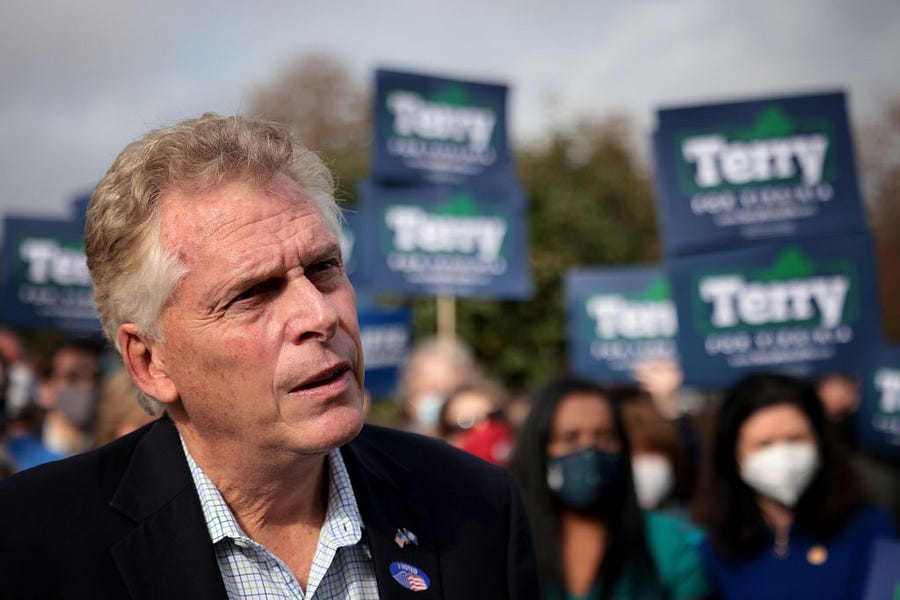Campaign Quick Hits
Turnout ≠ Base: Harry Enten, CNN analyst and former FiveThirtyEight guy, had me nodding my head this week. Both sides believe that elections are won by appealing to their base. The reason for this is that they believe that there are no persuadable voters in the middle and it’s all about turnout. But as Enten points out, for Democrats at least, the lower propensity voters aren’t going to respond to far left messaging. I’ll let him explain…
Democrats should keep in mind that the Democratic voters likely to sit out 2022 are not the left-wing base. They’ll probably be more moderate and mainstream Democrats …
Democrats hold a 1-point advantage among all registered voters on the generic congressional ballot, which is within the margin of error. Among those voters who say they’re extremely or very enthusiastic about voting in the midterms, Republicans hold a 4-point edge. Democrats, meanwhile, are up 6 points among those who are only somewhat or not enthusiastic about voting next year.
Now look at those who say they’re going to vote Democratic and are enthusiastic vs. those who are not. Very liberals make up 20% of those who are extremely or very enthusiastic about voting next year, while only 11% of those aren’t. That is, the Democratic voters who are more enthusiastic about voting next year are more likely to be very liberal than those [who] lack enthusiasm.
And why does nobody in the Democratic Party seem to notice or care? Because the party is perpetually staffed by “quad-to-campaign pipelines [that] continue to pump out a steady flow of enthusiastic young party staffers.” According to Democratic data guy David Shor (yep, same guy from last week),
[T]hey tend to hold views that are both more liberal and more ideologically motivated than the views of the coveted median voter, and yet they yield a significant amount of influence over the party’s messaging and policy decisions. As a result, Democrats end up spending a lot of time talking about issues that matter to college-educated liberals but not to the multiracial bloc of moderate voters that the party needs to win over to secure governing majorities in Washington.
Proving the point, Shor found that “a full 20 percent of the [Clinton campaign’s] ads—including “Mirrors”—made viewers more likely to vote for Republicans than people who hadn’t seen the same ads.” But perhaps most hilariously, “the more that [Shor’s] staff liked an ad, the worse it did with the general public.”
The point being that turnout isn’t the end all and be all for these guys. In the run up to 2020, I was a big proponent of the ‘turnout is life’ school of political thinking, but after the results came in my theory clearly couldn’t explain the changes we saw in Florida, Texas, and North Carolina. According to Shor, “the theory that the outcome of the 2020 election was the result of differences in voter turnout rather than changes in vote-switching is ‘the closest thing to flat earther-ism in politics.’” Shor is right; I was wrong.
Yes, Virginia, There Is A Political Narrative
The Virginia gubernatorial election is only three weeks away. A year ago, Joe Biden beat Donald Trump by 10 points. But polling consistently shows Virginia Democrat Terry McAuliffe’s lead shrinking to just under 3 points for the last several weeks. How election results are explained after the fact is always fascinating to me because the two outcomes don’t mirror each other. Just check out this headline from CNN last week, “Virginia’s gubernatorial election is more important than ever as a national barometer,” in which Stephen Collinson ably previews some of the handwringing to come.
Here are some examples of headlines I think we will see if Republican Glenn Youngkin pulls out a win:
-
Moderate Dems Weaponize Virginia Loss Against Progressive Agenda
-
Running Against Trump Proves Losing Strategy For Democrats
-
Voters Rebuke Democrats Over Race-Based Curriculums in Schools
-
Inflation, COVID, and Biden’s Slump Cost Democrats in Virginia
-
Do Low Turnout and Low Enthusiasm in Virginia Spell Doom for Dems in 2022?
-
PTA Parents Are The New Soccer Moms When It Comes to Voting
-
Does Younking’s Win In Virginia Pave the Way for Trump 2024?
But here’s what you might see if McAuliffe wins:
-
Moderate Dems Say Narrow Win in Virginia Proves Progressives Wrong
-
Trump Advisers Say Youngkin Didn’t Embrace Trump Enough
-
Critical Race Theory Not Enough to Push Republicans Over the Top in Blue Virginia
-
McAuliffe Pulls Out Win Despite Biden’s Approval Slump
-
Why McAuliffe’s Win in Virginia Won’t Help Democrats in 2022
-
Parents In Virginia Claim Victory Despite Youngkin Loss
-
Does Younkin’s Close Loss In Virginia Pave the Way for Trump 2024?
You see the problem? The narrative holds regardless of the outcome. Heads I win, tails you lose.
So what do I think is really at stake in Virginia? Virginia has moved from purple to reliably blue since 2008. McAuliffe should win so if he does by 3 or more points, it’s a dog-bites-man story and there’s not a whole lot to take away from it except that nothing going on right now (Biden’s approval rating/COVID/inflation) is dramatically altering the political landscape. If McAuliffe wins by less than 3 points, then I’m going to be looking at whether the tightness was driven by a) changes in partisan makeup of the D.C. suburbs, which are reliably blue, b) very high turnout in the already red parts of the state, or c) very low turnout in the blue parts of the state. Each one of those three lead to very different political diagnoses and prognostications obviously.
And then if McAuliffe loses, it will almost certainly be a combination of all three of those issues in which case it’s a narrative free for all. After the 2016 election, Clinton adviser Mandy Grunwald made the very smart point that whatever reason you thought Clinton lost was probably true; i.e., there were 47 independent things that went wrong and every one of them was sufficient in a tight election.
***
For more on the Virginia race, check out the piece by Audrey we published today.
The Republican candidate has taken advantage of the ongoing debate over critical race theory and parental input into curriculum decisions in K-12 schools, two issues that have become a major flashpoint for suburban parents around the country but particularly in Virginia. During a debate last month, Youngkin reminded voters that McAuliffe once vetoed a bill that would have allowed parents to opt their children out of any reading assignments that contained “sexually explicit” material.
Youngkin was rewarded with the soundbite he was looking for. “I don’t think parents should be telling schools what they should teach,” McAuliffe said during the debate.
Unlike McAuliffe, whose campaign has focused almost entirely on COVID-19, abortion, and Trump, Youngkin has zeroed in on kitchen table issuesvalues like K-12 education, tax reform, and public safety. “Every day we see that Virginia is just less safe than it used to be,” Youngkin told a crowd of roughly 15 sheriffs and deputies at a police week campaign event in McLean, Virginia last Thursday.
Taking the Goldberg Gambit Seriously
My friend, colleague, and competent trouser purchaser Jonah Goldberg floated the idea last week of a little rough justice for Republicans who support former President Donald Trump’s efforts to delegitimize America’s electoral system.
In a column, Jonah suggested “a third party with a simple, Reaganite conservative platform combined with a serious plank to defend the soundness of elections.” “If a Republican candidate met its requirements, a new party of the right could endorse the Republican, the way New York’s Conservative Party does,” Jonah wrote. “If not, a non-Trumpy candidate could play the role of spoiler by garnering enough conservative votes in the general election to throw the election to the Democrat.”
Jonah wrote more about it in his newsletters last week—here and here. But my incomplete understanding of his concept is that he wants to avoid throwing in with Democrats, as some Republicans have done, while still preventing Evan McMullin syndrome—where protest candidates become perennial candidates and designate themselves the leaders of ever-evolving political movements.
Indeed, some of the criticism of Jonah’s suggestion centers on McMullinism, in which political vigilantism morphs into an effort for “relevancy” (as measured in MSNBC hits). Jonah also took heat for how it would give massive power to Democrats. As Charles Cooke of National Review put it, “a federal takeover of the election system, de facto open borders, the full Bernie Sanders economic agenda, a set of historically aggressive gun-control measures, a codified Roe v. Wade, single-payer health care, and, potentially, a packed Supreme Court.” Imagine making all that happen with something a guy tossed into a newspaper column!
Jonah’s more-than-half-baked idea is subject to criticism for the potential disadvantages that would come from massive success—the kind Cooke describes—while simultaneously being dismissed as impossible. The Goldberg Gambit will be both so successful that it will deliver supermajorities to Democrats in Congress but it is also “doomed to failure” from the start because voters will reject it. Got it.
It seems like Jonah has said his piece on the subject and I hope is returning from his visit to Southern California in a state of transcendent dudeness. But I want to poke around on the question before we move on entirely. To do so, I’m going to have to take a few liberties with the idea to make it practically applicable. I hope my friend will forgive me. Then we can ask the question: Could it work?
My first liberty will be to excise the “Reaganite conservative” part except for as branding. Even defining that term and making it applicable to today’s policy debates would probably devolve into McMullinism pretty quickly. The goal would have to be punitive: simple vandalism of some Republican candidates’ chances. But which ones?
Let’s say that some rich folks were into Jonah’s idea and wanted to do the whole “regulators mount up” thing. They would have to keep the brand very tight to have maximal effect. They would also have to pick a small group of politicos to lead it. It would be essential to establish a strict charter that sets the internal process for picking the spoiler candidates. I’m picturing something like the recruitment scene from The Dirty Dozen but with huge nerds instead of Charles Bronson and Jim Brown. I would also place a tight time horizon on the effort to prevent it from living on in perpetuity to boost Democrats, a la the Lincoln Project. Now would be the time to act since the prospect of a Republican House majority refusing to certify the results of the 2024 presidential election is no joke. I’d dedicate it to the 2022 election and then set the self-destruct sequence for the day after the results are all certified. You could always reboot in 2024 or beyond if needed.
The obvious place to begin the hunt is with the eight senators and 139 members of the House who cast their votes on January 6 to reject the certification of results. John Kennedy of Louisiana is the only senator who backed Trump’s play who is up for re-election this cycle. Given the Pelican State’s jungle primary and runoff, it’s hard to see how the spoiler could have any effect. But the list of House coup dabblers includes plenty from districts where a few points might make a difference. Consider Rep. David Schwikert who represents Phoenix and part of its suburbs. He won reelection by 4 points last year, but outperformed Trump in his district. If the Goldbergian party had a candidate and enough resources to run a tough, focused campaign against the incumbent on his election vote, it might well make a difference. Or how about Rep, Jeff Van Drew, the party switcher from New Jersey? Or Rep. Carlos Gimenez, the former mayor of Miami, who won his seat by fewer than three points. Rep. Steve Chabot from Cincinnati works, too. And so on and so on. …
To be relevant, the spoiler party would also have to be able to oppose Republicans who didn’t vote to overturn the election, but would have or who are engaged in similar conduct on the state level. This probably calls for some kind of a pledge like the one Americans for Tax Reform used for decades to keep Republicans in line on tax hikes. “Joe Biden was duly elected president in November 2020 in free, fair elections. I pledge to respect and abide by the results certified by elections officials in this contest and in others…”
Republican nominees at the federal and statewide levels who sign on the line get an endorsement for election integrity they can tout. Those who refuse to sign the pledge go on the target list automatically, then the list would be ranked and sorted for maximum electoral effect and to punish the most egregious offenders.
There are tons of reasons why it might not add up to anything, particularly the lack of resources and the head start that McMullin, Bill Kristol, and others have in the dissident GOP space. But that said, it would not take too many examples to cause Republicans to recoil from Trump’s election chicanery the way they would from a tax increase. Remember, most of the folks who tried to help him steal the election did so out of fear, not courage. Pandering to pressure groups is right in their wheelhouses.









Please note that we at The Dispatch hold ourselves, our work, and our commenters to a higher standard than other places on the internet. We welcome comments that foster genuine debate or discussion—including comments critical of us or our work—but responses that include ad hominem attacks on fellow Dispatch members or are intended to stoke fear and anger may be moderated.
You are currently using a limited time guest pass and do not have access to commenting. Consider subscribing to join the conversation.
With your membership, you only have the ability to comment on The Morning Dispatch articles. Consider upgrading to join the conversation everywhere.